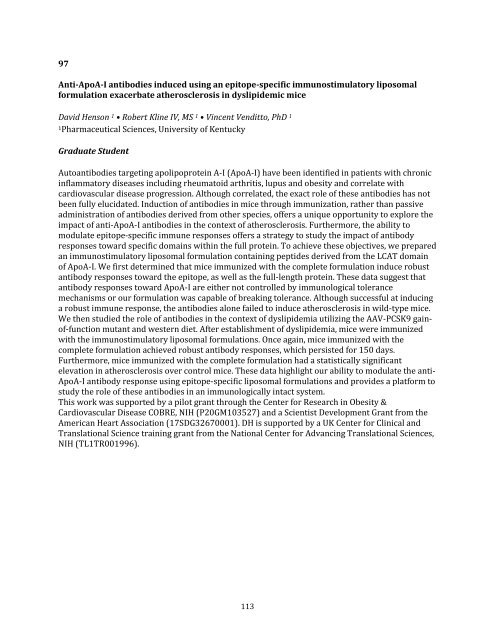2017 Cardiovascular Research Day Abstract Book
You also want an ePaper? Increase the reach of your titles
YUMPU automatically turns print PDFs into web optimized ePapers that Google loves.
97<br />
Anti-ApoA-I antibodies induced using an epitope-specific immunostimulatory liposomal<br />
formulation exacerbate atherosclerosis in dyslipidemic mice<br />
David Henson 1 • Robert Kline IV, MS 1 • Vincent Venditto, PhD 1<br />
1Pharmaceutical Sciences, University of Kentucky<br />
Graduate Student<br />
Autoantibodies targeting apolipoprotein A-I (ApoA-I) have been identified in patients with chronic<br />
inflammatory diseases including rheumatoid arthritis, lupus and obesity and correlate with<br />
cardiovascular disease progression. Although correlated, the exact role of these antibodies has not<br />
been fully elucidated. Induction of antibodies in mice through immunization, rather than passive<br />
administration of antibodies derived from other species, offers a unique opportunity to explore the<br />
impact of anti-ApoA-I antibodies in the context of atherosclerosis. Furthermore, the ability to<br />
modulate epitope-specific immune responses offers a strategy to study the impact of antibody<br />
responses toward specific domains within the full protein. To achieve these objectives, we prepared<br />
an immunostimulatory liposomal formulation containing peptides derived from the LCAT domain<br />
of ApoA-I. We first determined that mice immunized with the complete formulation induce robust<br />
antibody responses toward the epitope, as well as the full-length protein. These data suggest that<br />
antibody responses toward ApoA-I are either not controlled by immunological tolerance<br />
mechanisms or our formulation was capable of breaking tolerance. Although successful at inducing<br />
a robust immune response, the antibodies alone failed to induce atherosclerosis in wild-type mice.<br />
We then studied the role of antibodies in the context of dyslipidemia utilizing the AAV-PCSK9 gainof-function<br />
mutant and western diet. After establishment of dyslipidemia, mice were immunized<br />
with the immunostimulatory liposomal formulations. Once again, mice immunized with the<br />
complete formulation achieved robust antibody responses, which persisted for 150 days.<br />
Furthermore, mice immunized with the complete formulation had a statistically significant<br />
elevation in atherosclerosis over control mice. These data highlight our ability to modulate the anti-<br />
ApoA-I antibody response using epitope-specific liposomal formulations and provides a platform to<br />
study the role of these antibodies in an immunologically intact system.<br />
This work was supported by a pilot grant through the Center for <strong>Research</strong> in Obesity &<br />
<strong>Cardiovascular</strong> Disease COBRE, NIH (P20GM103527) and a Scientist Development Grant from the<br />
American Heart Association (17SDG32670001). DH is supported by a UK Center for Clinical and<br />
Translational Science training grant from the National Center for Advancing Translational Sciences,<br />
NIH (TL1TR001996).<br />
113


